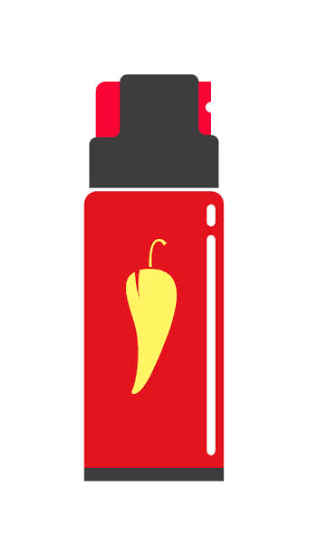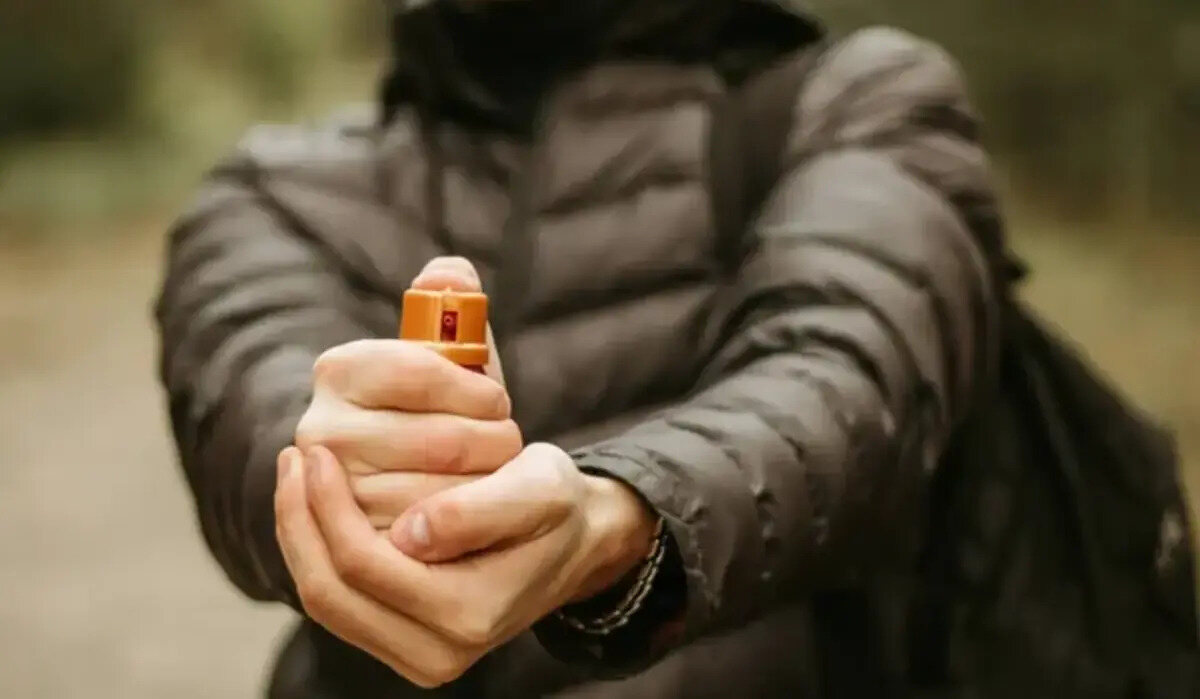Pepper spray is a quite popular self-defense mechanism that we can use to incapacitate an attacker temporarily. But, should it come in contact with the skin, it can cause intense burning sensations and discomfort. Here, Pepperspraymum takes a look at several methods and remedies that can be applied to stop pepper spray burn on the skin. So, whether you have accidentally come into contact with pepper spray or you want to be prepared in case of an emergency, this guide will equip you with the knowledge to alleviate the effects and promote healing. Let’s dive in!
Understanding Pepper Spray and Its Effects on the Skin
Pepper spray, scientifically known as oleoresin capsicum spray, is a non-lethal chemical irritant frequently utilized for self-defense. This defensive tool contains capsaicin, a compound extracted from chili peppers, that induces an intense burning sensation upon contact with the skin. The impact of pepper spray on the skin may differ depending on variables such as concentration, duration of exposure, and personal sensitivity.
Immediate Steps to Take When Exposed to Pepper Spray
When exposed to pepper spray, it’s essential to take immediate action to minimize the effects. Follow these steps to address pepper spray burn on the skin effectively:
Rinsing the Affected Area
Rapidly flushing the affected area with water is the first line of defense against pepper spray burns. Find a source of clean, running water and ensure that the water flows away from your face to prevent further contamination.
Using Mild Soap and Water
After rinsing the affected area, gently cleanse it with mild soap and water. This step helps remove residual pepper spray and reduces the burning sensation. Avoid using harsh soaps or scrubbing vigorously, as it may aggravate the skin further.
Applying a Milk Solution
Milk has soothing properties that can help alleviate the burning sensation caused by pepper spray. Soak a clean cloth or cotton ball in cold milk and gently dab it onto the affected area. The proteins in milk can provide relief and help neutralize the capsaicin.
Utilizing a Baking Soda Paste
Baking soda is a common household ingredient that can neutralize the effects of pepper spray. Mix baking soda with water to create a paste and apply it to the affected area. Leave the paste on for a few minutes before rinsing it off with water.
Using Diluted Hydrogen Peroxide
Hydrogen peroxide can help break down the capsaicin in pepper spray and minimize its effects. To use, dilute hydrogen peroxide with an equal amount of water and apply it to the affected area using a clean cloth or cotton ball. Rinse thoroughly with water after a few minutes.
READ: Can You Bring Pepper Spray to A Concert?
Applying Aloe Vera Gel
Aloe vera has natural soothing properties and can help alleviate the discomfort caused by pepper spray burn. Apply a generous amount of pure aloe vera gel to the affected area and gently massage it in. Repeat this process several times a day for optimal relief.
Using Cold Compresses
Cold compresses can provide temporary relief by numbing the affected area and reducing inflammation. Wrap ice or a cold pack in a clean cloth and apply it to the burn. Avoid direct contact with the skin to prevent ice burns, and limit application to 10-15 minutes at a time.
Avoiding Scratching or Rubbing
As tempting as it may be, avoid scratching or rubbing the affected area. This can worsen the irritation and potentially spread the capsaicin to other parts of the body. Instead, focus on cooling and soothing the skin using the methods mentioned above.
Washing Clothing and Accessories
If pepper spray has come into contact with your clothing or accessories, it’s crucial to wash them thoroughly. Pepper spray residue can linger on fabrics, potentially causing further irritation or recontamination. Follow the garment’s care instructions and wash them with mild detergent to remove any traces of pepper spray.
Using Over-the-Counter Remedies
If home remedies don’t provide sufficient relief, consider using over-the-counter remedies specifically formulated for burn relief. Look for products containing ingredients like lidocaine or benzocaine, which can numb the affected area and provide temporary relief. Follow the product’s instructions carefully.
Avoiding Harsh Chemicals
While it may be tempting to use harsh chemicals or abrasive substances to alleviate pepper spray burn, it’s important to avoid them. Harsh chemicals can further irritate the skin and potentially cause more harm than good. Stick to gentle, natural remedies for optimal results.
Applying Topical Analgesics
Topical analgesics, such as creams or ointments containing menthol or camphor, can provide a cooling sensation and temporary relief from pepper spray burn. Apply a thin layer to the affected area, following the product’s instructions. Avoid using these products on broken or irritated skin.
Seeking Medical Attention
If the symptoms persist or worsen despite home remedies, seek medical attention. A healthcare professional can assess the severity of the burn and provide appropriate treatment. They may prescribe topical medications or recommend additional steps to promote healing and minimize scarring.
Preventing Pepper Spray Exposure
While the focus of this article is on stopping pepper spray burn on the skin, it’s crucial to emphasize prevention. Here are some tips to avoid pepper spray exposure:
- Maintain situational awareness and avoid potentially dangerous situations whenever possible.
- Use pepper spray responsibly and only in self-defense situations.
- Familiarize yourself with the laws and regulations regarding pepper spray in your area.
- Practice proper handling and storage of pepper spray to prevent accidental discharge.
- Consider alternative self-defense options and choose the one that suits you best.
Understanding Pepper Spray Laws
Prior to procuring or utilizing pepper spray, it is critical to be knowledgeable of the laws and regulations that apply to its ownership and use. Statutory requirements relating to pepper spray may differ based on your locality, hence be sure to research thoroughly and acquaint yourself with the particular rules in your region. Guarantee you comply with all relevant legal practices before attaining or applying pepper spray for self-protection.
READ: What Happens When Pepper Spray Expires?
Alternative Self-Defense Options
While pepper spray can be an effective self-defense tool, it’s not suitable for everyone. If you’re looking for alternative options, consider the following:
- Personal alarms: Small devices that emit loud sounds to attract attention and deter potential attackers.
- Stun guns or tasers: Non-lethal devices that deliver an electric shock to incapacitate an assailant temporarily.
- Self-defense classes: Learning self-defense techniques can empower you and provide valuable skills to protect yourself.
Staying Prepared: Self-Defense Training
To enhance your personal safety, consider enrolling in self-defense training programs. These programs teach essential skills and techniques to defend yourself effectively in various situations. Whether it’s learning basic strikes and blocks or advanced techniques, self-defense training can boost your confidence and improve your ability to stay safe.
Maintaining Personal Safety
While self-defense tools and training are important, it’s equally crucial to maintain personal safety through proactive measures. Here are some general tips to help you stay safe:
- Avoid walking alone at night, especially in dimly lit areas.
- Stay alert and aware of your surroundings.
- Trust your instincts and avoid potentially risky situations.
- Inform friends or family about your whereabouts and travel plans.
- Be cautious when interacting with strangers, especially in unfamiliar environments.
FAQs
Can pepper spray cause permanent damage to the skin?
Pepper spray generally doesn’t cause permanent damage to the skin. However, severe cases or prolonged exposure may lead to complications or scarring. Seek medical attention if you experience persistent or worsening symptoms.
Can I use vinegar to neutralize pepper spray?
Vinegar is not recommended for neutralizing pepper spray. It can potentially worsen the burning sensation and irritation. Stick to milder remedies like water, mild soap, or the other methods mentioned earlier.
How long does it take for pepper spray burn to heal?
The healing time can vary depending on the individual and the severity of the burn. In most cases, pepper spray burn on the skin heals within a few days to a week with proper care and remedies.
Can I use petroleum jelly to soothe pepper spray burn?
Petroleum jelly may provide temporary relief by creating a barrier between the skin and the irritant. However, it’s advisable to opt for remedies specifically formulated for burn relief, as they offer more effective results.
Should I remove pepper spray from clothing immediately?
Yes, it’s crucial to remove pepper spray-contaminated clothing as soon as possible. Wash them thoroughly with mild detergent to remove any lingering residue that may cause further irritation.
Can pepper spray be washed off with just water?
Flushing the affected area with water is the first step to remove pepper spray from the skin. However, using mild soap or other remedies mentioned earlier can provide more effective results.
Conclusion
Pepper spray burns can be immensely tormenting and worrisome. By making use of the pieces of advice laid out in this instructional article, you may effectively minimize irritation while nurturing healing. Do not hesitate to act swiftly, rinse the area affected, and integrate relieving ointments like milk, baking soda, or even aloe vera gel into your strategy. If symptoms persist or become worse, contact medical personnel for proper assistance. To avoid the risk of pepper spray exposure remain educated on all safety protocols and prioritize your personal welfare always! Be smart and take care!
READ: Why Is My Pepper Spray Orange? [Answered]
Bliss Ferdinand is a resilient single mother and the founder of pepperspraymum.com, a blog dedicated to empowering women and promoting personal safety. With a passion for self-defense, Bliss shares her knowledge and experiences to help other mothers protect themselves and their families. Through her blog, she educates her readers about the effective use of pepper sprays, offering valuable insights, product reviews, and practical tips on staying safe in various situations. Bliss’s commitment to her community has inspired many women to take charge of their own security, making pepperspraymum.com a go-to resource for those seeking practical advice and peace of mind

